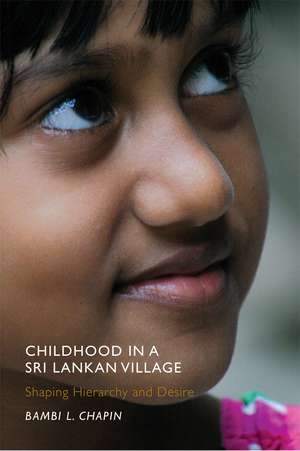Childhood in a Sri Lankan Village: Shaping Hierarchy and Desire: Rutgers Series in Childhood Studies
Autor Bambi L. Chapinen Limba Engleză Hardback – 30 iun 2014
Like toddlers all over the world, Sri Lankan children go through a period that in the U.S. is referred to as the “terrible twos.” Yet once they reach elementary school age, they appear uncannily passive, compliant, and undemanding compared to their Western counterparts. Clearly, these children have undergone some process of socialization, but what?
Over ten years ago, anthropologist Bambi Chapin traveled to a rural Sri Lankan village to begin answering this question, getting to know the toddlers in the village, then returning to track their development over the course of the following decade. Childhood in a Sri Lankan Village offers an intimate look at how these children, raised on the tenets of Buddhism, are trained to set aside selfish desires for the good of their families and the community. Chapin reveals how this cultural conditioning is carried out through small everyday practices, including eating and sleeping arrangements, yet she also explores how the village’s attitudes and customs continue to evolve with each new generation.
Combining penetrating psychological insights with a rigorous observation of larger social structures, Chapin enables us to see the world through the eyes of Sri Lankan children searching for a place within their families and communities. Childhood in a Sri Lankan Village offers a fresh, global perspective on child development and the transmission of culture.
Over ten years ago, anthropologist Bambi Chapin traveled to a rural Sri Lankan village to begin answering this question, getting to know the toddlers in the village, then returning to track their development over the course of the following decade. Childhood in a Sri Lankan Village offers an intimate look at how these children, raised on the tenets of Buddhism, are trained to set aside selfish desires for the good of their families and the community. Chapin reveals how this cultural conditioning is carried out through small everyday practices, including eating and sleeping arrangements, yet she also explores how the village’s attitudes and customs continue to evolve with each new generation.
Combining penetrating psychological insights with a rigorous observation of larger social structures, Chapin enables us to see the world through the eyes of Sri Lankan children searching for a place within their families and communities. Childhood in a Sri Lankan Village offers a fresh, global perspective on child development and the transmission of culture.
| Toate formatele și edițiile | Preț | Express |
|---|---|---|
| Paperback (1) | 313.73 lei 6-8 săpt. | |
| Rutgers University Press – 30 iun 2014 | 313.73 lei 6-8 săpt. | |
| Hardback (1) | 828.54 lei 6-8 săpt. | |
| Rutgers University Press – 30 iun 2014 | 828.54 lei 6-8 săpt. |
Din seria Rutgers Series in Childhood Studies
-
 Preț: 229.03 lei
Preț: 229.03 lei -
 Preț: 234.22 lei
Preț: 234.22 lei -
 Preț: 254.31 lei
Preț: 254.31 lei -
 Preț: 253.87 lei
Preț: 253.87 lei -
 Preț: 229.85 lei
Preț: 229.85 lei -
 Preț: 177.39 lei
Preț: 177.39 lei -
 Preț: 254.42 lei
Preț: 254.42 lei -
 Preț: 285.16 lei
Preț: 285.16 lei -
 Preț: 309.15 lei
Preț: 309.15 lei -
 Preț: 314.87 lei
Preț: 314.87 lei -
 Preț: 313.73 lei
Preț: 313.73 lei - 23%
 Preț: 838.12 lei
Preț: 838.12 lei -
 Preț: 285.16 lei
Preț: 285.16 lei -
 Preț: 284.57 lei
Preț: 284.57 lei -
 Preț: 292.55 lei
Preț: 292.55 lei -
 Preț: 307.95 lei
Preț: 307.95 lei -
 Preț: 299.60 lei
Preț: 299.60 lei -
 Preț: 289.79 lei
Preț: 289.79 lei -
 Preț: 306.56 lei
Preț: 306.56 lei -
 Preț: 342.92 lei
Preț: 342.92 lei -
 Preț: 306.73 lei
Preț: 306.73 lei -
 Preț: 339.86 lei
Preț: 339.86 lei -
 Preț: 285.16 lei
Preț: 285.16 lei -
 Preț: 286.52 lei
Preț: 286.52 lei -
 Preț: 311.56 lei
Preț: 311.56 lei -
 Preț: 304.43 lei
Preț: 304.43 lei -
 Preț: 286.09 lei
Preț: 286.09 lei -
 Preț: 306.73 lei
Preț: 306.73 lei -
 Preț: 272.25 lei
Preț: 272.25 lei -
 Preț: 319.71 lei
Preț: 319.71 lei -
 Preț: 314.87 lei
Preț: 314.87 lei -
 Preț: 318.75 lei
Preț: 318.75 lei -
 Preț: 343.52 lei
Preț: 343.52 lei -
 Preț: 288.06 lei
Preț: 288.06 lei
Preț: 828.54 lei
Preț vechi: 1134.99 lei
-27% Nou
Puncte Express: 1243
Preț estimativ în valută:
158.54€ • 165.97$ • 131.18£
158.54€ • 165.97$ • 131.18£
Carte tipărită la comandă
Livrare economică 05-19 aprilie
Preluare comenzi: 021 569.72.76
Specificații
ISBN-13: 9780813561660
ISBN-10: 0813561663
Pagini: 230
Ilustrații: 3 tables
Dimensiuni: 152 x 229 x 23 mm
Greutate: 0.54 kg
Ediția:None
Editura: Rutgers University Press
Colecția Rutgers University Press
Seria Rutgers Series in Childhood Studies
ISBN-10: 0813561663
Pagini: 230
Ilustrații: 3 tables
Dimensiuni: 152 x 229 x 23 mm
Greutate: 0.54 kg
Ediția:None
Editura: Rutgers University Press
Colecția Rutgers University Press
Seria Rutgers Series in Childhood Studies
Notă biografică
BAMBI L. CHAPIN is an associate professor of anthropology at the University of Maryland, Baltimore County.
Cuprins
Acknowledgments
Note on Translation and Transliteration
1. Introduction
2. Sri Lanka: Setting the Ethnographic Context
3. Socializing Desire: Demanding Toddlers and Self-Restrained Children
4. Shaping Attachments: Learning Hierarchy at Home
5. Making Sense of Envy: Desire and Relationships in Conflict
6. Engaging with Hierarchy outside the Home: Education and Efforts at Change
7. Culturing People
Notes
References
Index
Note on Translation and Transliteration
1. Introduction
2. Sri Lanka: Setting the Ethnographic Context
3. Socializing Desire: Demanding Toddlers and Self-Restrained Children
4. Shaping Attachments: Learning Hierarchy at Home
5. Making Sense of Envy: Desire and Relationships in Conflict
6. Engaging with Hierarchy outside the Home: Education and Efforts at Change
7. Culturing People
Notes
References
Index
Recenzii
"What makes this book so special is that it does not stop at description, as do most ethnographies. It goes on to explain Sinhalese childhood and child rearing, doing so within a well-considered, smartly-deployed psychoanalytic framework."
"This is a new kind of research on childhood, one that boldly focuses on a few trajectories of enculturation rather than covering a conventional set of contextual categories … Chapin carries this off with remarkable sophistication, skill and humility in a book that should be read by every student in this field."
"This is a nuanced and subtle book … I found it enthralling."
"Chapin's work is a significant contribution to the anthropology of childhood. It tackles important questions about the meaning of child care practices and patterns."
Descriere
Childhood in a Sri Lankan Village starts with a mystery: why do Sri Lankan children, normally rambunctious and demanding as toddlers, become uncannily compliant as they grow older? To answer this question, anthropologist Bambi Chapin spent over a decade tracking the development of children in a rural Sri Lankan village. What she learned gives us a fresh perspective on the ways children think and on how cultural beliefs are passed down through the generations.












